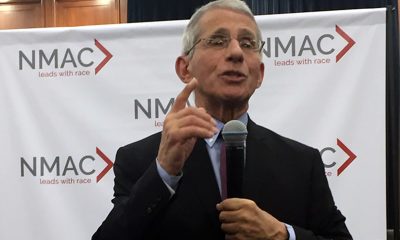Politics
New York Gender Recognition Act passes heads to Governor Cuomo
“We are protected by a constitution. Nowhere does it say that these rights don’t apply to one group of people.”

ALBANY, NY. – With a final push shepherded by openly gay New York State Assemblymember Daniel O’Donnell, (D), the New York State Assembly passed New York Senate Bill S4402 and its Assembly companion bill A5465, the Gender Recognition Act. The legislation now heads to New York’s Democratic Governor Andrew Cuomo who is expected to sign the measure.
The legislation allows for an “x” designation on the state’s driver’s licenses. The measure would also help waive an outdated rule requiring people to publish a notification in a newspaper when they change their name in the state.
“Today is a proud day for New York State, as we secure our standing as a leader in LGBTQ rights and ensure that transgender, non-binary, and intersex New Yorkers have the equality and dignity they deserve,” O’Donnell said. “No one should face overwhelming financial, medical, and bureaucratic barriers simply to have their existence officially recognized. These obstacles only serve to make people’s lives harder and more dangerous, particularly for trans New Yorkers of color who too often have limited resources, face disproportionate rates of violence, and are already marginalized by our legal system. I am deeply honored to carry this important bill and thank all of the trans, non-binary, and intersex advocates who have worked tirelessly to shape and support it.”
On Tuesday, June 8, the State Senate passed S4402, which was co-sponsored by openly gay State Senator Brad Hoylman. In an interview published the same day by The Hill, when asked about the GRA, O’Donnell noted that transgender rights is one of his life pursuits, and that there is still much work to be done.
“When marriage equality was passed, I knew there would be a backlash. I didn’t know the backlash would be directed at trans people, or involve bathrooms. So, there’s work to be done. Last year, we passed a bill that said if a bathroom only has one toilet, anyone is allowed to use it, to prevent people from being threatened or beaten up for using the wrong bathroom,” he said. “We are supposed to be free, and we’re all living in America where we are protected by a constitution. Nowhere does it say that these rights don’t apply to one group of people,” he added.
Happy Pride to all!!! 🌈🏳️⚧️🏳️🌈🏳️⚧️💫✨ https://t.co/9YTFBzQdo0
— Danny O’Donnell (@Danny_ODonnell_) June 11, 2021
Gay City News reported that the legislation drew praise from LGBTQ legal advocates who have long fought for reform. Andy Marra, who is the executive director of the Transgender Legal Defense & Education Fund (TLDEF), said TLDEF worked to secure key elements of the bill, including waiving the requirement for medical documentation as well as the removal of the publication requirement in newspapers.
“Along with our colleagues at the Empire Justice Center and the Gender Recognition Act Coalition, TLDEF worked closely with state lawmakers to craft some of the most inclusive legislation to date,” Marra said in an email to GCN. “This bill can now serve as a model for other states across the country.”
Congress
Top Congressional Democrats reintroduce Equality Act on Trump’s 100th day in office
Legislation would codify federal LGBTQ-inclusive non-discrimination protections

In a unified display of support for LGBTQ rights on President Donald Trump’s 100th day in office, congressional Democrats, including leadership from the U.S. House and U.S. Senate, reintroduced the Equality Act on Tuesday.
The legislation, which would prohibit discrimination on the basis of sexual orientation and gender identity, codifying these protections into federal law in areas from jury service to housing and employment, faces an unlikely path to passage amid Republican control of both chambers of Congress along with the White House.
Speaking at a press conference on the grass across the drive from the Senate steps were Senate Minority Leader Chuck Schumer (N.Y.), House Speaker Emerita Nancy Pelosi (Calif.), House Democratic Whip Katherine Clark (Mass.), U.S. Sen. Tammy Baldwin (Wis.), who is the first out LGBTQ U.S. Senator, U.S. Rep. Mark Takano (Calif.), who is gay and chairs the Congressional Equality Caucus, U.S. Rep. Chris Pappas (N.H.), who is gay and is running for the U.S. Senate, U.S. Sen. Cory Booker (N.J.), and U.S. Sen. Jeff Merkley (Ore.).
Also in attendance were U.S. Rep. Sarah McBride (Del.), who is the first transgender member of Congress, U.S. Rep. Dina Titus (Nev.), U.S. Rep. Mike Quigley (Ill.), and representatives from LGBTQ advocacy groups including the Human Rights Campaign and Advocates 4 Trans Equality.
Responding to a question from the Washington Blade on the decision to reintroduce the bill as Trump marks the hundredth day of his second term, Takano said, “I don’t know that there was a conscious decision,” but “it’s a beautiful day to stand up for equality. And, you know, I think the president is clearly hitting a wall that Americans are saying, many Americans are saying, ‘we didn’t vote for this.'”
A Washington Post-ABC News-Ipsos poll released Sunday showed Trump’s approval rating in decline amid signs of major opposition to his agenda.
“Many Americans never voted for this, but many Americans, I mean, it’s a great day to remind them what is in the core of what is the right side of history, a more perfect union. This is the march for a more perfect union. That’s what most Americans believe in. And it’s a great day on this 100th day to remind our administration what the right side of history is.”
Merkley, when asked about the prospect of getting enough Republicans on board with the Equality Act to pass the measure, noted that, “If you can be against discrimination in employment, you can be against discrimination in financial contracts, you can be against discrimination in mortgages, in jury duty, you can be against discrimination in public accommodations and housing, and so we’re going to continue to remind our colleagues that discrimination is wrong.”
The Employment Non-Discrimination Act, which was sponsored by Merkley, was passed by the Senate in 2013 but languished in the House. The bill was ultimately broadened to become the Equality Act.
“As Speaker Nancy Pelosi has always taught me,” Takano added, “public sentiment is everything. Now is the moment to bring greater understanding and greater momentum, because, really, the Congress is a reflection of the people.”
“While we’re in a different place right this minute” compared to 2019 and 2021 when the Equality Act was passed by the House, Pelosi said she believes “there is an opportunity for corporate America to weigh in” and lobby the Senate to convince members of the need to enshrine federal anti-discrimination protections into law “so that people can fully participate.”
Politics
George Santos sentenced to 87 months in prison for fraud case
Judge: ‘You got elected with your words, most of which were lies.’

Disgraced former Republican congressman George Santos was sentenced to 87 months in prison on Friday, after pleading guilty last year to federal charges of wire fraud and aggravated identity theft.
“Mr. Santos, words have consequences,” said Judge Joanna Seybert of the U.S. District Court for the Eastern District of New York. “You got elected with your words, most of which were lies.”
The first openly gay GOP member of Congress, Santos became a laughing stock after revelations came to light about his extensive history of fabricating and exaggerating details about his life and career.
His colleagues voted in December 2023 to expel him from Congress. An investigation by the U.S. House Ethics Committee found that Santos had used pilfered campaign funds for cosmetic procedures, designer fashion, and OnlyFans.
Federal prosecutors, however, found evidence that “Mr. Santos stole from donors, used his campaign account for personal purchases, inflated his fund-raising numbers, lied about his wealth on congressional documents and committed unemployment fraud,” per the New York Times.
The former congressman told the paper this week that he would not ask for a pardon. Despite Santos’s loyalty to President Donald Trump, the president has made no indication that he would intervene in his legal troubles.
Congress
Democratic lawmakers travel to El Salvador, demand information about gay Venezuelan asylum seeker
Congressman Robert Garcia led delegation

California Congressman Robert Garcia on Tuesday said the U.S. Embassy in El Salvador has agreed to ask the Salvadoran government about the well-being of a gay asylum seeker from Venezuela who remains incarcerated in the Central American country.
The Trump-Vance administration last month “forcibly removed” Andry Hernández Romero, a stylist who asked for asylum because of persecution he suffered because of his sexual orientation and political beliefs, and other Venezuelans from the U.S. and sent them to El Salvador.
The White House on Feb. 20 designated Tren de Aragua, a Venezuelan gang, as an “international terrorist organization.” President Donald Trump on March 15 invoked the Alien Enemies Act of 1798, which the Associated Press notes allows the U.S. to deport “noncitizens without any legal recourse.”
Garcia told the Washington Blade that he and three other lawmakers — U.S. Reps. Maxwell Alejandro Frost (D-Fla.), Maxine Dexter (D-Ore.), and Yassamin Ansari (D-Ariz.) — met with U.S. Ambassador to El Salvador William Duncan and embassy staffers in San Salvador, the Salvadoran capital.
“His lawyers haven’t heard from him since he was abducted during his asylum process,” said Garcia.
The gay California Democrat noted the embassy agreed to ask the Salvadoran government to “see how he (Hernández) is doing and to make sure he’s alive.”
“That’s important,” said Garcia. “They’ve agreed to that … we’re hopeful that we get some word, and that will be very comforting to his family and of course to his legal team.”

Garcia, Frost, Dexter, and Ansari traveled to El Salvador days after House Oversight and Government Reform Committee Chair James Comer (R-Ky.) and House Homeland Security Committee Chair Mark Green (R-Tenn.) denied their request to use committee funds for their trip.
“We went anyways,” said Garcia. “We’re not going to be intimidated by that.”
Salvadoran President Nayib Bukele on April 14 met with Trump at the White House. U.S. Sen. Chris Van Hollen (D-Md.) three days later sat down with Kilmar Abrego Garcia, a Maryland man who the Trump-Vance administration wrongfully deported to El Salvador on March 15.
Abrego was sent to the country’s Terrorism Confinement Center, a maximum-security prison known by the Spanish acronym CECOT. The Trump-Vance administration continues to defy a U.S. Supreme Court ruling that ordered it to “facilitate” Abrego’s return to the U.S.
Garcia, Frost, Dexter, and Ansari in a letter they sent a letter to Duncan and Secretary of State Marco Rubio on Monday demanded “access to” Hernández, who they note “may be imprisoned at” CECOT. A State Department spokesperson referred the Blade to the Salvadoran government in response to questions about “detainees” in the country.
Garcia said the majority of those in CECOT who the White House deported to El Salvador do not have criminal records.
“They can say what they want, but if they’re not presenting evidence, if a judge isn’t sending people, and these people have their due process, I just don’t understand how we have a country without due process,” he told the Blade. “It’s just the bedrock of our democracy.”

Garcia said he and Frost, Dexter, and Ansari spoke with embassy staff, Salvadoran journalists and human rights activists and “anyone else who would listen” about Hernández. The California Democrat noted he and his colleagues also highlighted Abrego’s case.
“He (Hernández) was accepted for his asylum claim,” said Garcia. “He (Hernández) signed up for the asylum process on an app that we created for this very purpose, and then you get snatched up and taken to a foreign prison. It is unacceptable and inhumane and cruel and so it’s important that we elevate his story and his case.”
The Blade asked Garcia why the Trump-Vance administration is deporting people to El Salvador without due process.
“I honestly believe that he (Trump) is a master of dehumanizing people, and he wants to continue his horrendous campaign to dehumanize migrants and scare the American public and lie to the American public,” said Garcia.
The State Department spokesperson in response to the Blade’s request for comment referenced spokesperson Tammy Bruce’s comments about Van Hollen’s trip to El Salvador.
“These Congressional representatives would be better off focused on their own districts,” said the spokesperson. “Instead, they are concerned about non-U.S. citizens.”


















